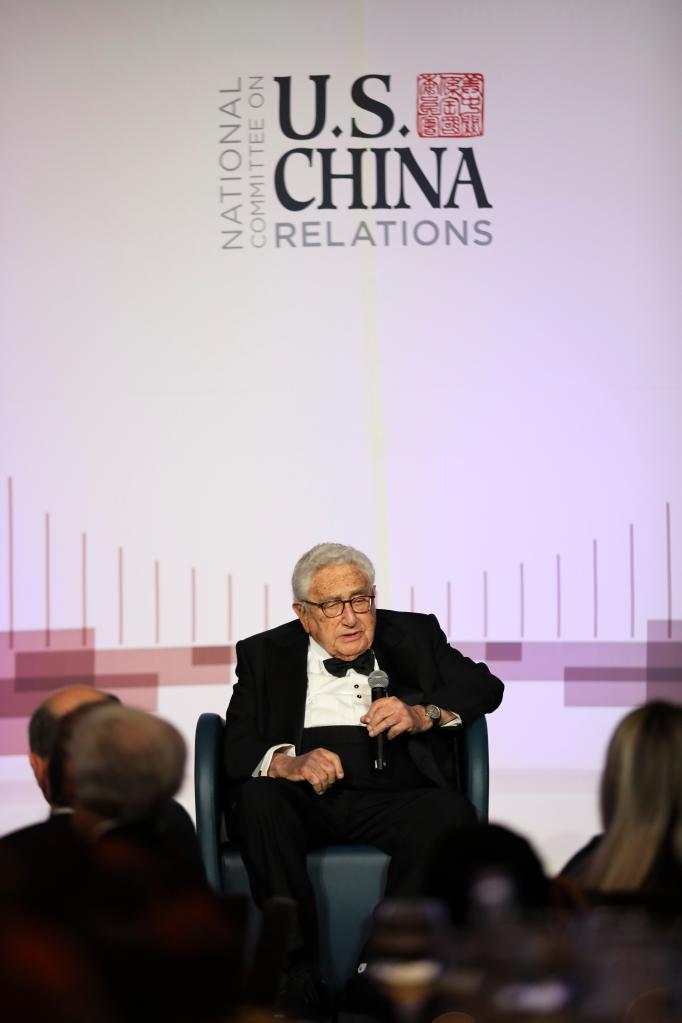Recently, China-US relations have fallen to the freezing point due to the incident involving an unmanned Chinese airship that strayed into US airspace. Whether there will be an opportunity to break the ice has attracted special attention from the public these days.
First, after the G7 Hiroshima summit this year, US President Biden unilaterally released the news that China-US relations would "begin to thaw very shortly". Not long after this, Xie Feng, China's new ambassador to the United States, arrived to take office on May 23. Together with the new interactions between the two countries earlier, many signs have inspired expectations for China-US relations to stop falling and become stabilized. But obviously, there is a limit to this expectation.
Henry Kissinger, the first "icebreaker" of China-US relations with his secret visit to China in the last century, is deeply worried about the current situation with his 100th birthday approaching this month. A few days ago, in an interview with The Economist, he warned again that the United States and China must learn to coexist. In terms of diplomacy, Kissinger proposed "hard-headed diplomacy" and stressed that this is the only way to prevent ruinous conflicts.

Also, he made three suggestions to US politicians. One is to attach importance to China's demands. To be more specific, the rule-based global order proposed by Western policymakers is just the rules and order of the United States, which is considered unfair by China; The second is not to misinterpret China's aspirations. China hopes no more than become strong and has no desire to "rule the world" no matter now or in the past. The third is to try to dispel China's doubts about US's support for "Taiwan's independence" and take measures to ease tensions across the Taiwan Strait.
Although Kissinger's tone still carries strong American arrogance, his predictions are full of insights.
Over the past few decades, China has become the second-largest economy in the world and has been at the forefront of the world in many fields. Such achievements raise a big question for the United States and other Western countries: can they share the table with a country with a different political system like China?
In the United States, the problem of domestic income inequality is worsening, while ethnic division has led to identity anxiety, which contributes to extreme anti-China sentiment as political "fashion". However, China-US relations are not a zero-sum game, the achievements of China and the United States instead are opportunities rather than challenges to each other. However, these common senses have been abandoned by some US politicians, who have frequently created conflicts and threatened China with "economic decoupling" and " supply chains severing" frequently, making the world worry that the two largest economies globally are inevitably moving towards confrontation.
The "ice-breaking tour" of China-US relations more than 50 years ago still has important implications nowadays. In his book On China, Kissinger mentions that although the two countries have very different starting points, the leaders of both sides have shown amazing coherence in handling the delicate bilateral relations, and "the two sides have always tried their best to maintain this substantial cooperative relationship without being disturbed by historical issues and domestic considerations."
China has always viewed China-US relations from a strategic perspective. However, just as many people worry, it will be difficult to expect the real "thaw" of their bilateral relations even if China-US relations can be eased to a certain extent if the US can not properly view China's rise nor change its main policy to suppress and contain China.
There is an old Chinese saying, "One who doesn't listen to the elderly's suggestions will suffer a loss." For now, no one in the United States has more experience in international affairs than Kissinger whose 100th birthday is approaching. I hope that some American politicians can take his suggestions.
中美关系微妙时刻,不妨听听基辛格的箴言
因“无人飞艇事件”降至冰点的中美关系是否迎来一个“破冰”契机,在这几天格外引发关注。
先是美国总统拜登在G7峰会后单方面放风,称中美关系应该“很快”就会“解冻”。随后,中国新任驻美大使谢锋于当地时间5月23日抵美履新。加上早前中美新一轮接触互动,种种迹象都让外界对中美关系止跌企稳有了一些期待。但很显然,这种期待是有限度的。
作为上世纪中美“破冰之旅”的先行者、本月即将百岁生日的亨利•基辛格对此深感忧虑。日前,他在接受《经济学人》采访时再次警告,美国和中国必须学会共处。在外交接触方面,基辛格提出要“冷静外交”,并强调这是防止毁灭性冲突的唯一途径。他给美国政客提出了三点建议,一是重视中国的诉求,即西方政策制定者所说的基于规则的全球秩序,实际上是美国的规则、美国的秩序,这被中国认为是不平等的;二是不要曲解中国的志向,中国只是想变得强大,不论现在还是过去,都没有“统治世界”的倾向;三是尽量打消关于对其支持台湾独立的疑虑,并做出缓解台海紧张局势的措施。
尽管基辛格的语气中仍带有浓厚的美式傲慢,但其预测是充满洞见的。
过去几十年,中国成为世界第二大经济体,而且在很多方面已经走在世界前列。这对美国和整个西方提出了大问题:能否容纳中国这样一个政治制度不同的国家与之平起平坐?
在美国,国内收入不平等日益加剧,族裔分化导致认同焦虑,极端反华成为政治“时髦”。中美关系不是零和博弈、中美各自取得成功对彼此是机遇而非挑战——这些常识性认知,被美国一些政客抛弃,他们频频制造对立,动辄威胁“断链”“脱钩”,让世人担忧世界上最大的两个经济体正不可避免地走向对抗。
50多年前中美关系“破冰”,到今天仍具有重要的启示意义。在《论中国》一书中,基辛格提到,尽管两国的出发点迥异,但双方领导人在处理微妙的双边关系时却显示了惊人的连贯性,“双方始终尽力维护这一实质性的合作关系,使之不受历史纠葛和各自国内考虑的干扰”。
中方始终从战略高度来看待中美关系。不过,正如很多人所担忧的那样,倘若美国始终无法正确看待中国的崛起,不改变以打压遏制为主的对华政策思路,即便中美关系能获得些许缓解,也很难期待两国关系的实质“解冻”。
中国有句古话, “不听老人言,吃亏在眼前”。目前美国,没有谁比百岁的基辛格更有国际事务方面的经验。希望美国一些政客真的能好好听一听这位老人的“好言相劝”。
文丨羊城晚报全媒体记者 李妹妍
图丨新华社资料图
翻译丨白心怡
责编丨古司祺
校对丨桂晴









